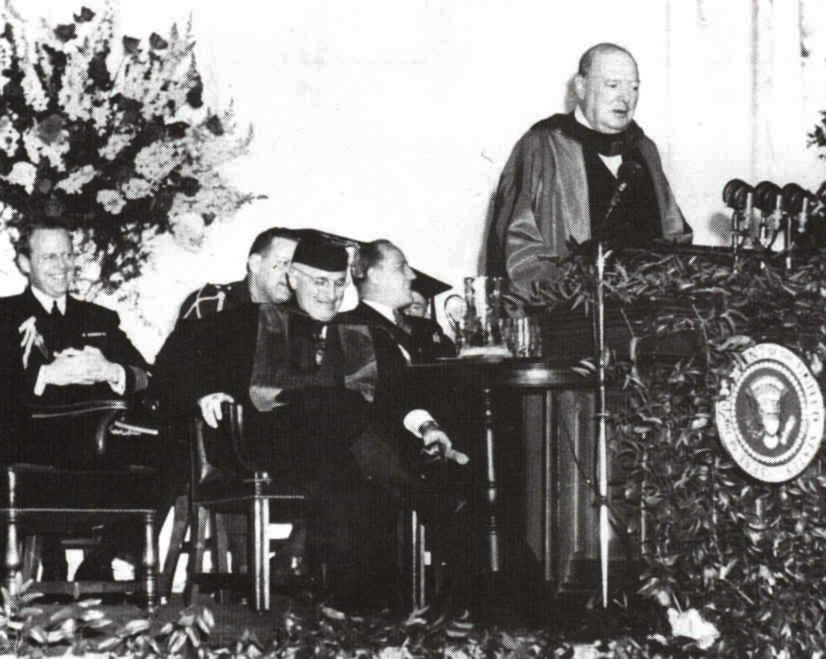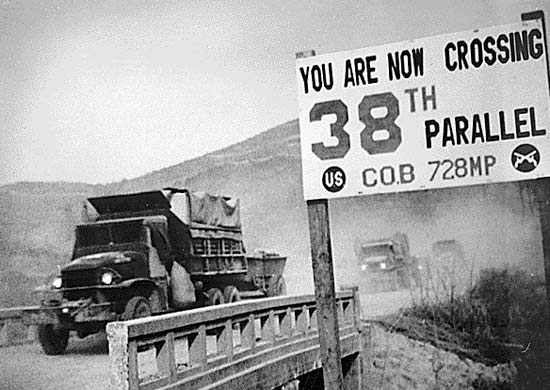THE TENNESSEE STATE HALL OF FAME



Winston Churchill’s “Iron Curtain” speech at Westminster College in Fulton, Missouri on March 5, 1946, identifies the beginning of the Cold War for many people. Indeed, relations between the U.S.A. and her allies and the Soviet Union and its allies had chilled considerably since the end of World War II. The following forty-five years would see the world in a constant state of turmoil with instances of regional fighting involving proxies, occasional direct confrontation between the two super powers, and one case of brinkmanship with the potential for nuclear war. At nearly every step of the way, Tennessee figured in events. When Churchill delivered his historic speech, Camp Campbell was still an active army post, even though demobilization was in progress, and Oak Ridge remained in army hands. In 1947, the U.S. Army decided to keep Camp Campbell as a permanent installation, and in 1948, the situation got more serious. In far off Berlin, Germany, the Soviets blockaded traffic in and out of the city by land. They were trying to force American, British and French forces out of Berlin. The American-led response, the Berlin Airlift, saved the city and forged an enduring alliance between the Germans and the Western powers. These same Western powers would soon become the nucleus of the North Atlantic Treaty Organization (NATO). In that same year, 1948, the U.S. military created a nuclear storage facility on Fort Campbell and called it Clarksville Base. It remained an active nuclear site, and a potential target for a Soviet attack, until 1965. Nuclear weapons were the deterrent that held Soviet aggression at bay throughout the Cold War; consequently, the location of these weapons was of utmost concern to the Soviets and a matter of supreme security for the U.S.A..
A true, deployable tactical unit, the 11th Airborne Division arrived at Fort Campbell in 1949. The North Atlantic Treaty Organization came into being that same year. This alliance stood on the firm foundation of American tactical and strategic strength, including the nuclear weapons and conventional forces based at Clarksville Base and Fort Campbell. In 1950, the Cold War turned hot when a Soviet client state, North Korea, attacked an American ally, South Korea. A United Nations force, led by the U.S.A., intervened to eject the invading North Korean army.

That conflict lasted until 1953, and saw 10,500 Tennesseans serve. The fighting eventually ended with a truce rather than a winner and a loser, although the North Koreans were driven from South Korea. It is also true that the expansion of communism to South Korea was stopped.
While the fighting was going on in Korea, Sun Records began operations in Memphis, in 1952. Sun Records was destined to give a start to several country and rock performers. Elvis Presley, Johnny Cash, Jerry Lee Lewis and Carl Perkins were foremost among them. Other events of note in 1952, include the election of Dwight D. Eisenhower as President of the U.S.A., with Tennessee’s vote.
The burning issue of desegregation received a big legal boost in 1954, with the case Brown vs. Board of Education. This Supreme Court decision ordered desegregation of the nation’s schools. In Clinton, Tennessee, school desegregation seemed to be following a legal and peaceful path in 1955, when John Kasper from Washington, D.C. appeared and changed the thinking of some people. Ultimately, the governor sent 600 National Guardsmen to restore peace to the community.
Perseverance began to pay off, and in 1957, one of the pioneering black students, Robert “Bobby” Cain graduated. He was the first black student to graduate from an integrated Tennessee school. The 101st Airborne Division came to Fort Campbell in 1956. Soon thereafter, in 1957, President Eisenhower sent some of these same troops to Little Rock, Arkansas to protect black students who were integrating the all-white Central High School.
Southern-agrarian author Andrew Lytle of Murfreesboro and Monteagle published his book, The Velvet Horn, in 1957. The Southern Agrarians were associated with the Southern Renascence and embraced the agrarian way of life with a nod toward self-reliance. Another Pulitzer Prize came to Tennessee in 1958. James Agee of Knoxville won the prize for his book A Death in the Family. Agee, too, was associated with the Southern Renascence.

Clarksville native Wilma Rudolph represented the U.S.A. at the 1960 Olympic Games in Rome. She won three gold medals in track and was thus the first American woman to do so. A black female who had conquered polio as a child, Rudolph did much to overcome racism and was called “the fastest woman in the world.”
The Cold War grew very tense in 1961, when the communist East Germans built a wall in Berlin, Germany, blocking traffic between East and West Berlin. This was an attempt to stop East Germans from escaping communist East Germany. It was reminiscent of the Berlin Blockade of 1948, and saw American and Soviet tanks face each other across the border. This wall gave a visible meaning to Winston Churchill’s 1946 description of the “Iron Curtain.” The contest between the communist East and the democratic West moved ever closer to a shooting war in 1962. The Soviets stationed missiles in Cuba and threatened the U.S.A. President Jack Kennedy proved the master in this case of brinksmanship and faced down Soviet leader Nikita Kruschev. The Soviets removed their missiles, but the world held its collective breath as it was possible full-scale war—even nuclear war—might break out. A year later in November 1963, President Kennedy fell victim to an assassin’s bullet, and Lyndon Johnson succeeded to the presidency. President Johnson would soon make a decision that drew American soldiers into contact against the Soviet client state of North Vietnam. This was the Gulf of Tonkin Resolution of 1964, and the Vietnam War ensued as America tried to stop the “domino effect” of states falling to communism.
Civil rights remained on the front burner in America and in the state. The Civil Rights Act of 1964 desegregated public facilities, such as hotels and theatres and prohibited discrimination in hiring practices on the basis of race. The Voting Rights Act of 1965 complemented the 1964 Act by allowing federal agents to assure registration of black voters and thus transformed the South politically.
References:
Bergeron, Paul H., Stephen V.Ash and Jeanette Keith. Tennesseans and Their History. Knoxville: The University of Tennessee. 2007.
Foner, Eric and John Garraty, eds. The Reader’s Companion to American History. Boston: Houghton Miflin Co. 1991.
O’Brien, John. A History of Fort Campbell. Kentucky: The History Press. 2014.
Van West, Carroll, Ed.-in-Chief. The Tennessee Encyclopedia of History and Culture. Nashville: Tennessee Historical Society, Rutledge Hill Press. 1998.
Waters, Charles and John Butler, eds. Historic Clarksville 1784-2004, 2nd ed. Clarksville: Historic Clarksville Publishing Company. 2004.
Winn, Thomas Howard. “Time-Line-1780-1984 U.S.-Tennessee-Clarksville- Montgomery County.” Clarksville: Austin Peay State University. Working Document. 1984.